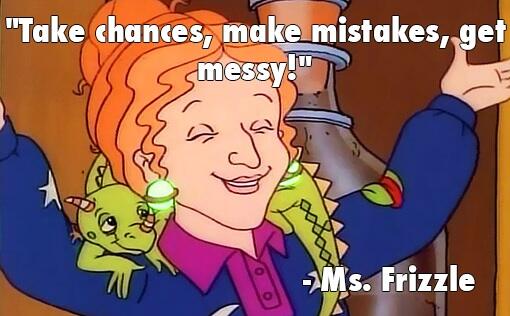It’s no secret to anyone who knows me that I find language fascinating.
Today I’d like to share three things about language that I don’t think most people realize. And if they have realized these things, they easily forget. Even I do, sometimes.
To be fair, I don’t fluently speak any besides English, but I know small numbers of words in a very large variety of languages. And every single one that I learn anything about has something spectacularly cool about it. They all find such different ways to communicate similar thoughts, feelings, and knowledge.
There is something that all languages have in common, though, no matter what part of the world it started in, or what linguistic category it belongs to. Every language that is either spoken/used or written by living people can do something that is literally magic:
By making a series of sounds, hand movements, or squiggles on a page, we can transfer things out of my brain and into yours. I’m doing it right now.
I had a series of brainwaves zip around inside my gray matter, and because I made some shapes on a device, now the same brainwaves are happening in yours.
To paraphrase Terry Pratchett, just because we know how it works doesn’t mean it’s not magic.
Now, our messages don’t always transfer flawlessly.
THING #1: Each human being on the planet has slightly different DNA structure in their brains. Combine that with slightly different life experiences, and voila. Chaos.
Every brain in the whole world is essentially running its own unique operating system. Some systems convert data between themselves without too much trouble. Others can barely manage simple ideas without ending up with horrific conversion errors and miscommunications.
That’s just the way brains work. We all see and interpret things just a tiny bit differently. And even when we come remarkably close to understanding the original speaker, it’s still never going to be exact.
I think we don’t realize that very often. We tend to think that the words we say will always mean the same thing to someone else as they do to us. That’s what causes the things that are most important to us to also be the things that become most divisive. Religion. Politics. Morality. Lifestyle choices.
But despite this inherent, omnipresent risk of conversion error, language can also do the opposite. In a single hand gesture, or 2–3 audible syllables, or a few scribbles on a page, we can connect more closely than we’d ever be able to without language.
When someone says “Thank you” or “I’m sorry” or “I love you”, our brainwaves sync up just a little bit more. We connect just that much more closely.
You know something that makes language even more magical? That we can make those sounds, motions, or squiggles mean new things just by ordering them differently.
We can make our sounds convey completely different information just by changing the volume we say them in. We can instill our words with intense implications based entirely on how our bodies are standing when we say or type or signal them.
And the funniest part about that? (To me, anyway.)
THING #2: That it is literally impossible to separate language from that context without losing most of its potency. Even in ancient, no-longer-spoken languages, we can find voice and tone and implication that make the messages they speak more nuanced than we could possibly have imagined.
And when we do lose that context to history? So much of the message is also lost or changed.
I don’t think that I have ever, in my 34 years of life, seen or heard an argument where this didn’t come into play. Especially on the internet. Flame wars are FAMOUS for this nonsense.
Someone will inevitably say something rich in tone, implication, and often vitriol. As humans, we pick up on this, even if we don’t know we’re doing it. Even in text. But the moment someone does pick up on the tone, the original speaker will throw an absolute fit about not literally having said any of that, and not actually being interpreted correctly, and they DEMAND that their words are taken at face value only.
Guess what? We literally can’t. It’s actually, factually impossible to communicate human-to-human without body language, tone, context, and connotation. Even the choice of word order changes everything.
Believing otherwise is honestly absurd.
(And I sincerely believe that most of these internet trolls/45th presidents of the United States don’t ACTUALLY believe it can be done, either. Not if they were to give it any honest thought. I believe that they are just looking for loopholes. Things to stack in their favor, so that their side of the argument holds more weight. It’s a tactic, not a logical, reasonable thing to expect of anyone.)
I’ll be honest, I don’t have a particularly good transition into thing #3. Sorry.
Most people I know think it’s silly that I care so much about proper communication. When I agonize over the utter illiteracy of my facebook friends, or judge political candidates based on how badly their platform blurbs are written in the election guides, I’m called phrases like “anal retentive” or “grammar nazi”.
That makes me sad, but not because the phrases themselves are inaccurate, per se. It’s more their implication. That unseen, somewhat amorphous context and connotation that we can’t shake from phrases, even if we use them with innocent intent.
Saying that my attention to communication is silly implies that communication itself doesn’t matter very much. That clarity of speech and form is useless. That miscommunication in itself is not the major cause of half of history’s horrific tragedies, if not more.
Saying that language isn’t very important is to deny that our abilities to communicate with one another are, in fact, magic. Some of the oldest magic that humankind has created. Older than fire. Older than wheels. Older than the ability to domesticate animals or farm grains.
Before any of that, we started to communicate with each other. We have prehistoric humans communicating to us across millennia because they left cave drawings that still exist in the year 2019.
THING #3: Communication is truly one of the most magical things a human can do.
Think about it. Everything that stirs our souls in art or music or writing is one human communicating ideas from their brains to ours. And if, as they say, art is what we stay alive for, then does it not follow that language—no matter the media—is the lifeblood of what it means to be human?
But to appreciate it—to truly use our magical superpowers for good and not evil—we have to first recognize what we’re dealing with.
We have to recognize our different processing systems. We have to recognize the context of what we are saying, and we have to take responsibility for it. We have to actively realize and accept that our words will always have context and tone and connotation that cannot be stripped.
We have to recognize that communication is vital to being human, and that care and consideration matter, when we speak, write, or gesture. That the things we say will affect people for good or ill, whether or not we mean them to.
We have to recognize that our ability to communicate with others is the single most powerful and dangerous part of the human race. Atom bombs and genocides and horrifically bloody wars have never once happened without language first being used to convince others that those things were necessary. Not a single instance.
With great power comes great responsibility. How will you wield yours?











